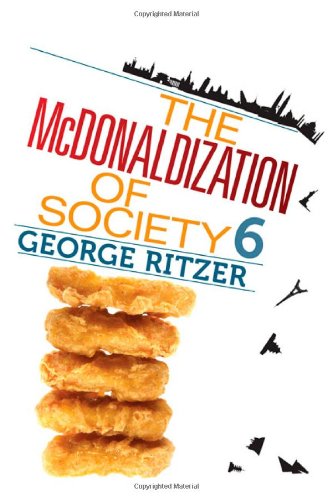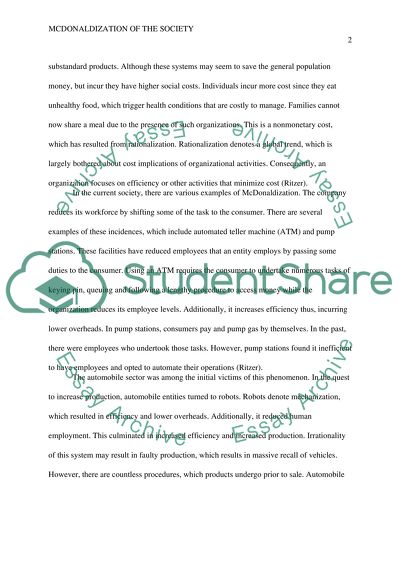The McDonaldization of Society is a concept introduced by sociologist George Ritzer in his book of the same name, published in 1993. It refers to the process by which the principles of the fast-food restaurant chain McDonald's have come to dominate various aspects of modern society, including the economy, culture, and even the way we think.
According to Ritzer, the McDonaldization of society is characterized by four main components: efficiency, calculability, predictability, and control. These principles have been adopted by various industries and institutions in order to increase efficiency and profits, but they have also had a profound impact on society as a whole.
Efficiency refers to the optimization of resources and processes in order to achieve the greatest output with the least input. In the context of McDonald's, this means streamlining the production and delivery of food to customers in order to minimize costs and maximize profits. In society, this principle has been applied to various sectors, including education, healthcare, and even social interactions.
Calculability refers to the emphasis on quantifiable outcomes over qualitative experiences. In the context of McDonald's, this means focusing on the speed and efficiency of food production and delivery, rather than the quality or taste of the food itself. In society, this principle has led to a focus on measurable goals and objectives, such as test scores and productivity metrics, rather than more intangible concepts like creativity and personal fulfillment.
Predictability refers to the creation of standardized and uniform experiences, in order to reduce uncertainty and increase control. In the context of McDonald's, this means offering a consistent menu and customer service experience across all locations. In society, this principle has led to the standardization of various systems and processes, such as education and healthcare, in order to increase efficiency and control.
Control refers to the centralization and rationalization of decision-making in order to increase efficiency and predictability. In the context of McDonald's, this means using a top-down management structure in which decisions are made by a small group of executives and implemented by lower-level employees. In society, this principle has led to the concentration of power and decision-making in the hands of a few powerful individuals or organizations.
Overall, the McDonaldization of society has had both positive and negative impacts. On the one hand, it has contributed to increased efficiency and predictability in various industries and institutions, leading to cost savings and increased productivity. On the other hand, it has also led to the standardization and homogenization of culture, and a focus on quantifiable outcomes over qualitative experiences. It is up to individuals and society as a whole to decide whether the benefits of McDonaldization outweigh the costs.







